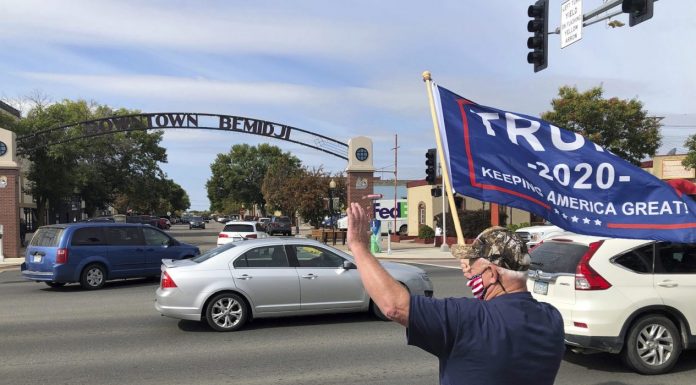(Headline USA) A solidly blue state for the past half century, Minnesota became an unquestioned presidential battleground on Friday as President Donald Trump and Democratic challenger Joe Biden fought for working-class voters in dueling events that marked the beginning of early voting.
The candidates steered clear of the state’s most populated areas near Minneapolis to focus on blue-collar voters, some of whom shifted to Republicans for the first time in 2016.
Trump was headed to Bemidji, about 200 miles north of Minneapolis, while Biden campaigned in a suburb of Duluth, on the banks of Lake Superior and close to the Wisconsin border.
Since narrowly losing Minnesota in 2016, Trump has emphasized the state in hopes that a victory this year could offset losses in other states.
He has visited regularly and kept a close eye on issues of particular importance to rural corners of the state.
He’s reversed an Obama administration policy prohibiting the development of copper-nickel mining and has bailed out soybean, corn and other farmers who have been hurt by trade clashes with China.
More recently, he’s embraced a “law and order” message aimed nationally at white suburban and rural voters who may be concerned by protests that have sometimes become violent.
That’s especially true in Minnesota, where the May killing of George Floyd by a police officer sparked a national reckoning on racism.
Since Floyd’s death and the race riots that followed, Minneapolis has been devastated by skyrocketing violent crime rates as city officials have been at the forefront of calls to defund police.
David McIntosh, president of the conservative Club for Growth, which has produced anti-Biden ads, said Minnesota may help the Trump campaign build momentum.
“They’re looking beyond the poll numbers and seeing the potential there,” said McIntosh, a former congressman from Indiana. “It’s always smart strategy to go on offense somewhere.”
Trump’s path to Minnesota success likely depends on finding more votes in rural, conservative areas—running up the score beyond his 2016 tally.
It’s a strategy he’s trying to pull off in other states, and it depends on a robust field operation with the money and time to track down infrequent or first-time voters.
That could be a tall order since Minnesota already has one of the nation’s highest voter turnout rates.
“I don’t think they’re there,” said Joe Radinovich, a Democrat who lost a bid for a northern Minnesota congressional district in 2018.
Radinovich noted the major organizational challenge and expense in tracking new voters, making sure they’re registered and getting them to vote – especially during a pandemic.
“We have relatively high turnout already. Most people vote. I just don’t think it’s there. I think those people showed up in 2016,” he said.
In 2016, Trump won that district, which includes the Democratic city of Duluth, by 15 percentage points. But in the midterms two years later, Radinovich lost by just under 6 percentage points.
Still, Trump has spent more than a year building a sizable Minnesota ground game.
Republicans are out knocking on doors and interacting personally with voters in ways that Democrats mostly have not, preferring online operations because of the coronavirus.
The president’s reelection campaign announced this week a $10 million ad buy in a series of states, including Minnesota.
It has spent nearly $17 million on advertising in the state since last October, compared with almost $6.3 million for Biden over the same period, according to a review of Kantar/CMAG data by The Associated Press.
Adapted from reporting by the Associated Press

